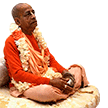Spiritual Consciousness - an essential subject: Difference between revisions
(Created page with "Category:Essential Subjects <!----------------------- edit below this line -----------------------> <!------------------------ begin introduction text --------------------...") |
(Vanibot #0041: Moves Choose Another box to the end) |
||
| Line 2: | Line 2: | ||
<!----------------------- edit below this line -----------------------> | <!----------------------- edit below this line -----------------------> | ||
<!------------------------ begin introduction text ------------------------> | <!------------------------ begin introduction text ------------------------> | ||
Spiritual consciousness means to become free from all designations. That freedom is achieved when we are in constant touch with the Supreme Spirit, Kṛṣṇa. According to brahminical culture, one should be content with whatever he obtains without special endeavor and should cultivate spiritual consciousness. This will make one happy happy. The purpose of the Kṛṣṇa consciousness movement is to spread this understanding. People who do not have scientific spiritual knowledge mistakenly think that the members of the Kṛṣṇa consciousness movement are escapists trying to avoid material activities. In fact, however, we are engaged in real activities for obtaining the ultimate happiness in life. Spiritual consciousness, the supreme happiness, is not enjoyed by the senses. Being transcendental to the senses, that is real happiness, but we have taken happiness as sense enjoyment. By sense enjoyment, nobody can become happy because we are in material existence and our senses are false senses. Real senses are spiritual senses. We have to awaken our spiritual consciousness and then by spiritual senses we can enjoy. | |||
Srila Prabhupada's books, lectures, conversations and letters offer a comprehensive presentation of this essential subject as seen in the '''[[Vaniquotes:Category:Spiritual Consciousness| | Srila Prabhupada's books, lectures, conversations and letters offer a comprehensive presentation of this essential subject as seen in the Vaniquotes '''[[Vaniquotes:Category:Spiritual Consciousness|Spiritual Consciousness]]''' category. An introduction from his books is given below in the following 16 quotes. | ||
<!-------- end introduction text and don't touch next three lines ---------> | <!-------- end introduction text and don't touch next three lines ---------> | ||
---- | ---- | ||
== Quotes from Srila Prabhupada's books == | == Quotes from Srila Prabhupada's books == | ||
<!----------------- edit quote boxes below this line -----------------> | <!----------------- edit quote boxes below this line -----------------> | ||
{{VaniQuotebox| | {{VaniQuotebox|People are unfortunate in spiritual consciousness in the Kali-yuga, and nature disturbs them in so many ways, especially through incurable diseases like cancer and through frequent wars and among nations|People in Kali-yuga are mandāḥ, all bad, and sumanda-matayaḥ, misled by false conceptions of life, they are killing cows in the thousands. Therefore they are unfortunate in spiritual consciousness, and nature disturbs them in so many ways, especially through incurable diseases like cancer and through frequent wars and among nations. As long as human society continues to allow cows to be regularly killed in slaughterhouses, there cannot be any question of peace and prosperity. '''(Śrīmad-Bhāgavatam 8.8.11)'''}} | ||
{{VaniQuotebox| | {{VaniQuotebox|By material association we lose our spiritual consciousness; consequently there is the question of the auspicious and inauspicious. But those who are atmarama, or self-realized, have transcended such questions|By material association we lose our spiritual consciousness; consequently there is the question of the auspicious and inauspicious. But those who are ātmārāma, or self-realized, have transcended such questions. The ātmārāmas, or self-realized persons, gradually making further progress in spiritual bliss, come to the platform of association with the Supreme Personality of Godhead. That is the perfection of life. '''(Śrīmad-Bhāgavatam 4.22.14)'''}} | ||
{{VaniQuotebox| | {{VaniQuotebox|By his (the living entity's) personal endeavor in association with authorities, saintly persons and a spiritual master, he has to understand his position and then revert to spiritual consciousness or Krsna consciousness|By his personal endeavor in association with authorities, saintly persons and a spiritual master, he has to understand his position and then revert to spiritual consciousness or Kṛṣṇa consciousness by understanding Bhagavad-gītā as it is explained by the Personality of Godhead. '''(Bhagavad-gītā 13.24)'''}} | ||
{{VaniQuotebox| | {{VaniQuotebox|Because of his deep family affection, a man forgets his main duty of controlling the senses and improving his spiritual consciousness|The common man does not know the destiny of his life; he is simply busy in his flash of life, maintaining his family. At the last stage, no one is satisfied with how he has improved the family economic condition; everyone thinks that he could not provide sufficiently. Because of his deep family affection, he forgets his main duty of controlling the senses and improving his spiritual consciousness. '''(Śrīmad-Bhāgavatam 3.30.18)'''}} | ||
{{VaniQuotebox| | {{VaniQuotebox|As Krsna never falls, when we revive our spiritual consciousness, Krsna consciousness, we never fall again to material existence. One should understand the position of the supreme Acyuta, Krsna|As Kṛṣṇa never falls, when we revive our spiritual consciousness, Kṛṣṇa consciousness, we never fall again to material existence. One should understand the position of the supreme Acyuta, Kṛṣṇa. '''(Śrīmad-Bhāgavatam 7.7.54)'''}} | ||
{{VaniQuotebox| | {{VaniQuotebox|Although a devotee may fall from the path of spiritual consciousness, he will nonetheless attain a human body in the home of a devotee or a rich man. In this way one can resume his devotional service|Nārada Muni therefore advised Vyāsadeva that one should take to Kṛṣṇa consciousness, devotional service, and abandon all ordinary occupational duties. This advice was also given by Lord Kṛṣṇa Himself. Although a devotee may fall from the path of spiritual consciousness, he will nonetheless attain a human body in the home of a devotee or a rich man. In this way one can resume his devotional service. '''(Śrīmad-Bhāgavatam 4.28.28)'''}} | ||
{{VaniQuotebox| | {{VaniQuotebox|Actually it is deplorable to become famous on the basis of the body or to become known as a man of spiritually developed consciousness without knowing the supreme spirit, Visnu|It is only due to ignorance that everyone is striving after the name, fame and profit connected with the body. But actually it is deplorable to become famous on the basis of the body or to become known as a man of spiritually developed consciousness without knowing the supreme spirit, Viṣṇu. Real fame belongs to one who attains Kṛṣṇa consciousness in this very life. '''(Teachings of Lord Caitanya, Chapter 32)'''}} | ||
{{VaniQuotebox| | {{VaniQuotebox|A person desiring to advance in spiritual consciousness must be especially careful not to see a woman's face or hear a woman's voice|A person desiring to advance in spiritual consciousness must be especially careful not to see a woman's face or hear a woman's voice. To see a woman's face and appreciate its beauty or to hear a woman's voice and appreciate her singing as very nice is a subtle falldown for a brahmacārī or sannyāsī. '''(Śrīmad-Bhāgavatam 6.18.41)'''}} | ||
{{VaniQuotebox|A relationship between husband and wife without spiritual consciousness but strictly for sense gratification is not at all good|A relationship between husband and wife without spiritual consciousness but strictly for sense gratification is not at all good. It is said in Śrīmad-Bhāgavatam (12.2.3) that especially in this age, Kali-yuga, dām-patye 'bhirucir hetuḥ: the relationship between husband and wife will be based on sexual power. '''(Śrīmad-Bhāgavatam 6.18.40)'''}} | |||
{{VaniQuotebox|In the mediocre category - the human form of life - spiritual consciousness is comparatively awakened. In the superior life forms, spiritual consciousness is fully awakened|In the mediocre category—the human form of life—spiritual consciousness is comparatively awakened. In the superior life forms, spiritual consciousness is fully awakened. Then the living entity understands his real position and tries to escape the influence of material energy by developing Kṛṣṇa consciousness. '''(Caitanya-caritāmṛta, Madhya-līlā 6.156)'''}} | |||
{{VaniQuotebox|A devotee should always remain atmavan, or situated in his spiritual position. He should not forget that his main concern is to make advancement in spiritual consciousness, or Krsna consciousness|A devotee should be compassionate towards them and instruct them as far as possible in making advancement in Kṛṣṇa consciousness. A devotee should always remain ātmavān, or situated in his spiritual position. He should not forget that his main concern is to make advancement in spiritual consciousness, or Kṛṣṇa consciousness, and he should not ignorantly identify himself with the body or the mind. '''(Śrīmad-Bhāgavatam 3.27.8)'''}} | |||
{{VaniQuotebox|Devotees engaged in devotional service are not very much attached to their bodies, unlike the yogis, who are too attached to the body and who think that by performing bodily gymnastic exercises they will advance in spiritual consciousness|A special advantage in devotional service is that devotees not only enjoy the transcendental pastimes of the Lord by hearing and chanting and glorifying them, but also are not very much attached to their bodies, unlike the yogīs, who are too attached to the body and who think that by performing bodily gymnastic exercises they will advance in spiritual consciousness. '''(Śrīmad-Bhāgavatam 4.9.12)'''}} | |||
{{VaniQuotebox|If a bhakta is not completely perfect he takes birth in the material world again, but in a very exalted position, either in a rich family or a family of the purest brahmanas, just to finish his development in spiritual consciousness|Those who are karmīs, jñānīs and yogīs return to this material world after death, whereas bhaktas do not. Of course, if a bhakta is not completely perfect he takes birth in the material world again, but in a very exalted position, either in a rich family or a family of the purest brāhmaṇas. '''(Śrīmad-Bhāgavatam 8.19.12)'''}} | |||
{{VaniQuotebox|A devotee of the Supreme Lord who takes advantage of the beautiful and invigorating downpour of the transcendental descriptions of God found in Vedic literature finds his spiritual consciousness invigorated and refreshed|The lakes, ponds, and rivers are cleansed and invigorated by the downpour of new rainwater and thus become most beautiful. Similarly, a devotee of the Supreme Lord who takes advantage of the beautiful and invigorating downpour of the transcendental descriptions of God found in Vedic literature finds his spiritual consciousness invigorated and refreshed. In this way his spiritualized body becomes very beautiful. '''(Light of the Bhāgavata, Chapter 10)'''}} | |||
{{VaniQuotebox|From the very beginning without wasting time in bodily exercises, a devotee searches out a pure devotee and simply by his association becomes more advanced in spiritual consciousness than any yogi|Yogīs are generally not very much interested in devotional service; they want to regulate the breathing process. This is simply a bodily concern. Here Dhruva Mahārāja plainly says that a devotee has no more bodily interest. He knows that he is not the body. From the very beginning, therefore, without wasting time in bodily exercises, a devotee searches out a pure devotee and simply by his association becomes more advanced in spiritual consciousness than any yogī. '''(Śrīmad-Bhāgavatam 4.9.12)'''}} | |||
{{VaniQuotebox|If one wants success in life, he should immediately understand from the right sources what his self-interest is and how he should mold his life in spiritual consciousness|If one wants success in life, he should immediately understand from the right sources what his self-interest is and how he should mold his life in spiritual consciousness. One should understand himself to be part and parcel of Kṛṣṇa and thus completely take shelter of His lotus feet for guaranteed spiritual success. '''(Śrīmad-Bhāgavatam 7.5.5)'''}} | |||
<!----------------- edit quote boxes above this line -----------------> | <!----------------- edit quote boxes above this line -----------------> | ||
| Line 31: | Line 47: | ||
'''Spiritual Consciousness - [[Vaniquotes:Category:Spiritual Consciousness|explore more within this category]]'''. | '''Spiritual Consciousness - [[Vaniquotes:Category:Spiritual Consciousness|explore more within this category]]'''. | ||
{{EsentialSubjectTotal}} | |||
<div style="float:left;"> | |||
{{EssentialSubjectnav}} | |||
</div> | |||
__NOTOC__ | __NOTOC__ | ||
__NOEDITSECTION__ | __NOEDITSECTION__ | ||
Latest revision as of 17:41, 22 November 2020
Spiritual consciousness means to become free from all designations. That freedom is achieved when we are in constant touch with the Supreme Spirit, Kṛṣṇa. According to brahminical culture, one should be content with whatever he obtains without special endeavor and should cultivate spiritual consciousness. This will make one happy happy. The purpose of the Kṛṣṇa consciousness movement is to spread this understanding. People who do not have scientific spiritual knowledge mistakenly think that the members of the Kṛṣṇa consciousness movement are escapists trying to avoid material activities. In fact, however, we are engaged in real activities for obtaining the ultimate happiness in life. Spiritual consciousness, the supreme happiness, is not enjoyed by the senses. Being transcendental to the senses, that is real happiness, but we have taken happiness as sense enjoyment. By sense enjoyment, nobody can become happy because we are in material existence and our senses are false senses. Real senses are spiritual senses. We have to awaken our spiritual consciousness and then by spiritual senses we can enjoy.
Srila Prabhupada's books, lectures, conversations and letters offer a comprehensive presentation of this essential subject as seen in the Vaniquotes Spiritual Consciousness category. An introduction from his books is given below in the following 16 quotes.
Quotes from Srila Prabhupada's books
Spiritual Consciousness - explore more within this category.
Vanipedia has now over 903 introductory articles compiled from Srila Prabhupada's books under the series titled Essential Subjects. All these articles can be seen in the Table of Content on the right side of this article and also here in this Umbrella Category. Browse through them to relish the breadth and depth of Srila Prabhupada's teachings - There is a subject for everyone.















